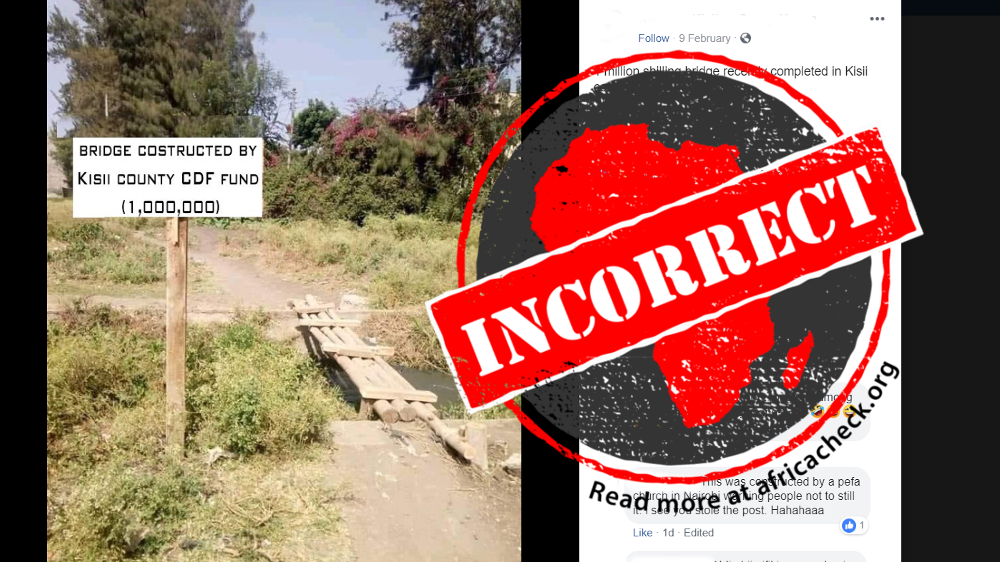After months of reports of Kenyan county officials helping themselves to public funds, a photo of a KSh1 million bridge in Kisii is getting attention on Facebook.
The bridge is just four wooden poles held together with planks, laid over a stream of grey water. In front of it is a sign that reads: “Bridge costructed (sic) by Kisii county CDF fund (1,000,000)”.
The image was posted to Facebook with the comment: “1 million shilling bridge recently completed in Kisii county. God is watching.” It has so far attracted over 500 reactions, 200 comments and some 60 shares.

The first clue that the image is phony is that CDF stands for constituency development fund. The fund, established by law, is used by the national government through members of parliament to carry out projects in Kenya’s 290 constituencies. It is not a county fund. Kisii is a county with a county government.
A digital analysis using Fotoforensics also shows that the writing on the sign was digitally altered.
In another doctored version the sign credits an “MCA” – member of county assembly – in the Rigoma county assembly ward in Kisii.
Bridge built by church in Nairobi
A reverse image search traced the original photo to a structure built by a Pentecostal Evangelistic Fellowship of Africa church in Kenya.
Africa Check contacted the church to find out more about the bridge and its location. According to its deputy secretary general, Thomas Tembo Chipa, it was built to help members get to a church compound in Nairobi. It’s more than 300 kilometres from Kisii county’s capital.
“I can confirm that it is true that the signboard [but not as worded] exists,” he said. “It is located in Nairobi’s Saika Estate. It is a simple structure that enable Christians access the church compound.” – Dancan Bwire (15/02/2019)
The bridge is just four wooden poles held together with planks, laid over a stream of grey water. In front of it is a sign that reads: “Bridge costructed (sic) by Kisii county CDF fund (1,000,000)”.
The image was posted to Facebook with the comment: “1 million shilling bridge recently completed in Kisii county. God is watching.” It has so far attracted over 500 reactions, 200 comments and some 60 shares.

Fotoforensics reveals image was altered
The first clue that the image is phony is that CDF stands for constituency development fund. The fund, established by law, is used by the national government through members of parliament to carry out projects in Kenya’s 290 constituencies. It is not a county fund. Kisii is a county with a county government.
A digital analysis using Fotoforensics also shows that the writing on the sign was digitally altered.
In another doctored version the sign credits an “MCA” – member of county assembly – in the Rigoma county assembly ward in Kisii.
Bridge built by church in Nairobi
A reverse image search traced the original photo to a structure built by a Pentecostal Evangelistic Fellowship of Africa church in Kenya.
Africa Check contacted the church to find out more about the bridge and its location. According to its deputy secretary general, Thomas Tembo Chipa, it was built to help members get to a church compound in Nairobi. It’s more than 300 kilometres from Kisii county’s capital.
“I can confirm that it is true that the signboard [but not as worded] exists,” he said. “It is located in Nairobi’s Saika Estate. It is a simple structure that enable Christians access the church compound.” – Dancan Bwire (15/02/2019)
Republish our content for free
For publishers: what to do if your post is rated false
A fact-checker has rated your Facebook or Instagram post as “false”, “altered”, “partly false” or “missing context”. This could have serious consequences. What do you do?
Click on our guide for the steps you should follow.
Publishers guideAfrica Check teams up with Facebook
Africa Check is a partner in Meta's third-party fact-checking programme to help stop the spread of false information on social media.
The content we rate as “false” will be downgraded on Facebook and Instagram. This means fewer people will see it.
You can also help identify false information on Facebook. This guide explains how.


Add new comment